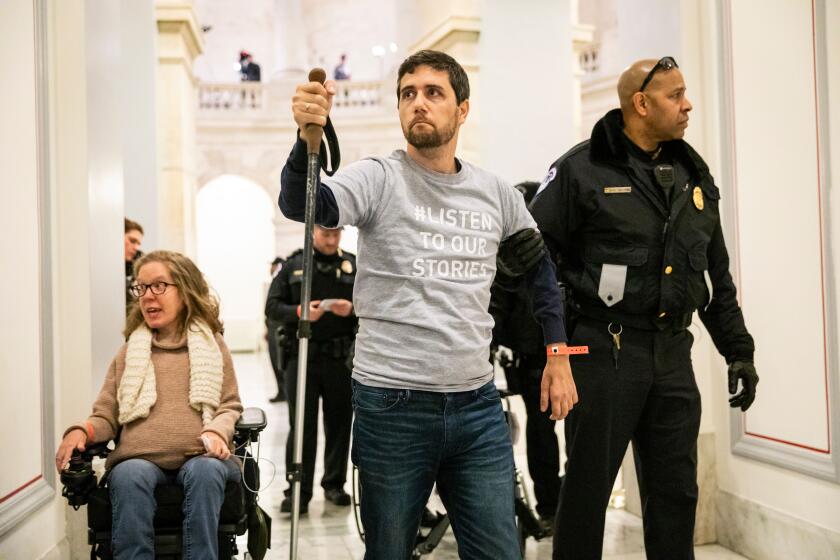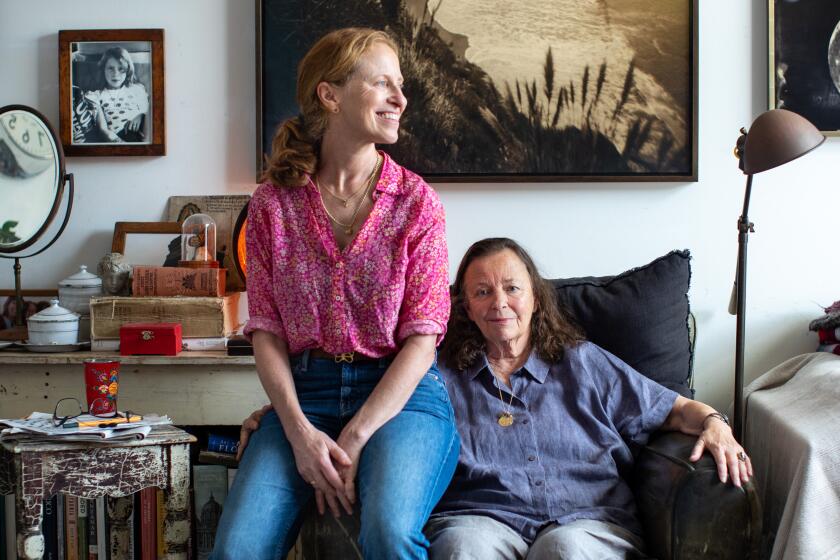‘A roaring from my body’: Novelist Cai Emmons on writing while running out of time
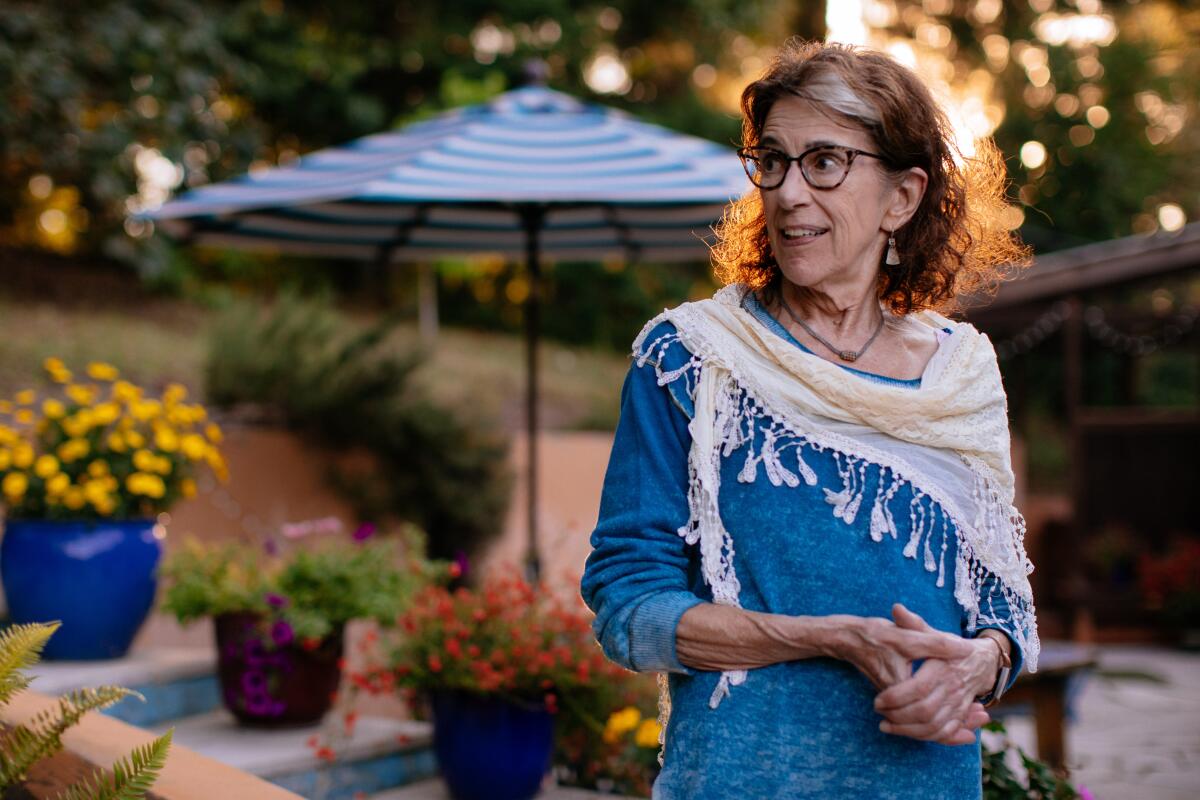
- Share via
The novelist Cai Emmons, who has intimately explored the rough contours traced by rage, grief and happiness onto ordinary lives for 20 years, has two novels out in September, “Unleashed” and “Livid.” The reason for the near-simultaneous release — and the extraordinary productivity and urgency behind it — was the shattering news she received on Feb. 4, 2021.
It was in December of 2019 that Emmons first noticed her voice had lost its “musicality” and words had become more difficult to pronounce. Convinced her teeth were shifting, she tried wearing a retainer. After multiple tests, she was given a diagnosis of bulbar-onset ALS and a life expectancy of two to five years. With the loss of speech came the ableist assumption that she was no longer able to communicate — a misconception she was bent on obliterating with a torrent of writing. Not only did she push to complete two novels she’d been working on for three years; she also turned to her blog to document, in diaristic but frequently poetic prose, the experience of living with ALS.
Emmons and her husband, playwright Paul Calandrino, welcomed me into their Eugene, Ore., home on one of those cobalt-blue mid-August days. Emmons and I sat on the patio of their hillside house, with black-chinned and Anna’s hummingbirds buzzing above us, to speak for four hours about her writing, career, family life and illness with the help of a voice synthesizer that took nothing away from Emmons’ sense of humor and even joy.
“Unleashed” is a novel about a woman whose body undergoes profound changes after her only daughter leaves for college. Though Emmons wrote much of it in 2020, before her illness was diagnosed, she believes it was marked by its progress through her body.
The novel “was written over the year when I was losing my voice,” she says. “It seemed to run out of me, and it was so weird, but I didn’t care. And when I was done, shortly after that I got the diagnosis. That book seemed like something that was a roaring from my body.”
Fall arts and entertainment picks from music, books, TV, arts and movies.
Looking back on her earlier work, Emmons, now 71, wondered if this kind of “subliminal body consciousness” had always been there. “It checks out if I look at all my books. It’s a very abstract thing to say, but it feels true. I think it’s a kind of ‘muse,’ but it is deeply entangled with the body.” Losing the ability to speak brought new questions into her life and work: “How do I fit into the world without the voice at first? And then how do I fit into the world without the body, without agency, depending on others?”
While the ALS diagnosis has brought frustration and extreme physical limitations, it has also filled her with wonder. As she types out her thoughts, she laughs. “I am being reduced in some ways to my mind and my thoughts,” she says. “I will soon have little agency over anything else and I don’t find that terrible. A little worrying of course, when it comes to writing and communicating, but to be pure consciousness. How great is that, right?”
A long line of Western philosophers wanted a mind untethered to the messy reality of the human body. The supposed mind-body split has played a part in many troubling ideologies, from misogynist notions of womanhood to eugenics. But it has also fueled Emmons’ work, much of it infused with surreal or magical realist elements, long before it took up residence in her body.
An early play by Emmons, “Mergatroid,” explored the lives of children born without genetic sex. Her 2018 novel, “Weather Woman,” envisioned a character able to repair climate change with her mind. (Emmons, who has master’s degrees in both film and writing, was a playwright before she switched to prose fiction.) Her novels have explored multiple themes endemic to West Coast life, including the roles of class and history and the anxieties of environmental degradation, but also the bonds of female friendships and the exigencies imposed by family.
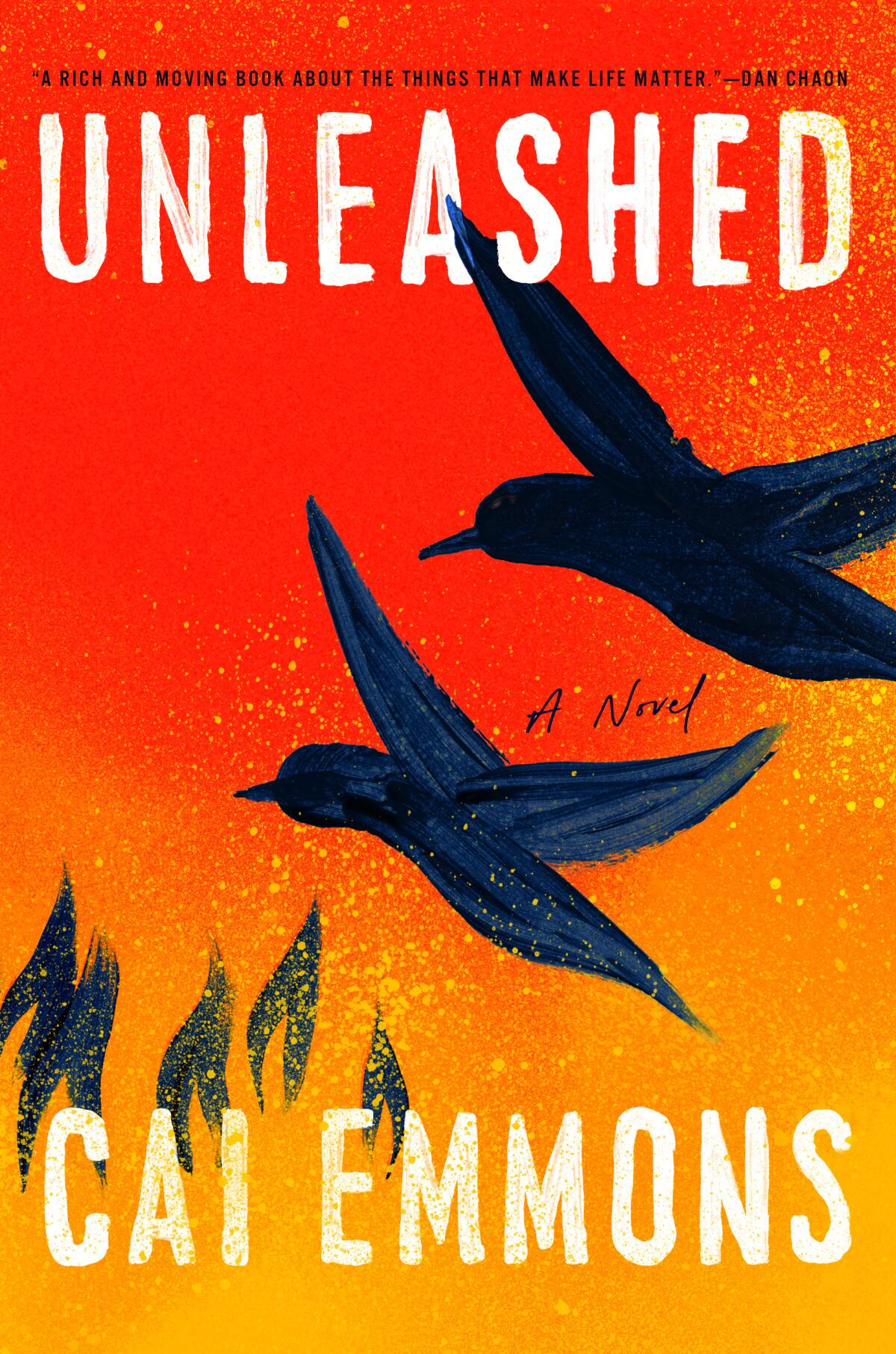
“Unleashed” partakes in some of these themes and transformations, though their engine is a multivalent form of grief. It opens as Sonoma vintners Lu and George Barnes drop their daughter, Pippa, off at UCLA. George is considerably older, the wealthy man who married working-class Lu. As the fall progresses, George is preoccupied by the extended drought and the threat of autumn fires; Lu, neglected, feels Pippa’s absence as physical pain. Emmons’ plot takes a surreal turn when George strays from the marriage and the forest around the vineyard begins to burn.
“Livid” also features a mother-daughter relationship, but it confronts the long-term rage that simmers in many women as they come to understand how misogyny and racism have constricted their lives. Sybil, recently returned to western Oregon after living on the East Coast for years, is selected for jury duty. She is empaneled for a murder trial along with — surprise — her ex-husband, rekindling her resentment over how he treated her.
Rage — and the way it evolves as we grow older and the world changes — seems to preoccupy these late novels.
“I just wrote an essay about the roller coaster of anger,” Emmons says. “And I think it’s different now because of having had hope that things were changing. On the other hand, I remember anger about the Vietnam War, the treatment of the Black Panthers, and abortion. And I remember I had a lot to be angry about back then too.”
Activist Ady Barkan was diagnosed with ALS at 32. Five years later, his tragic but inspiring story is the subject of a new documentary.
Emmons grew up in the Boston area; her father worked in publishing while her mother was a stay-at-home mom and a full-time activist; both were active in the civil rights movement. “They were trying to get the schools desegregated, so I grew up with the feeling that a lot needed to be changed. Then I went to college and got even angrier.”
That anger inspired some of her first writing: At 7 she wrote an impassioned poem about neighbors who opposed desegregation. Naturally, her work and her understanding have grown more nuanced. “What has always interested me is the subtle forms of misogyny and sexism rather than the overt ones, the daily insults and humiliations that we have to suck up.”
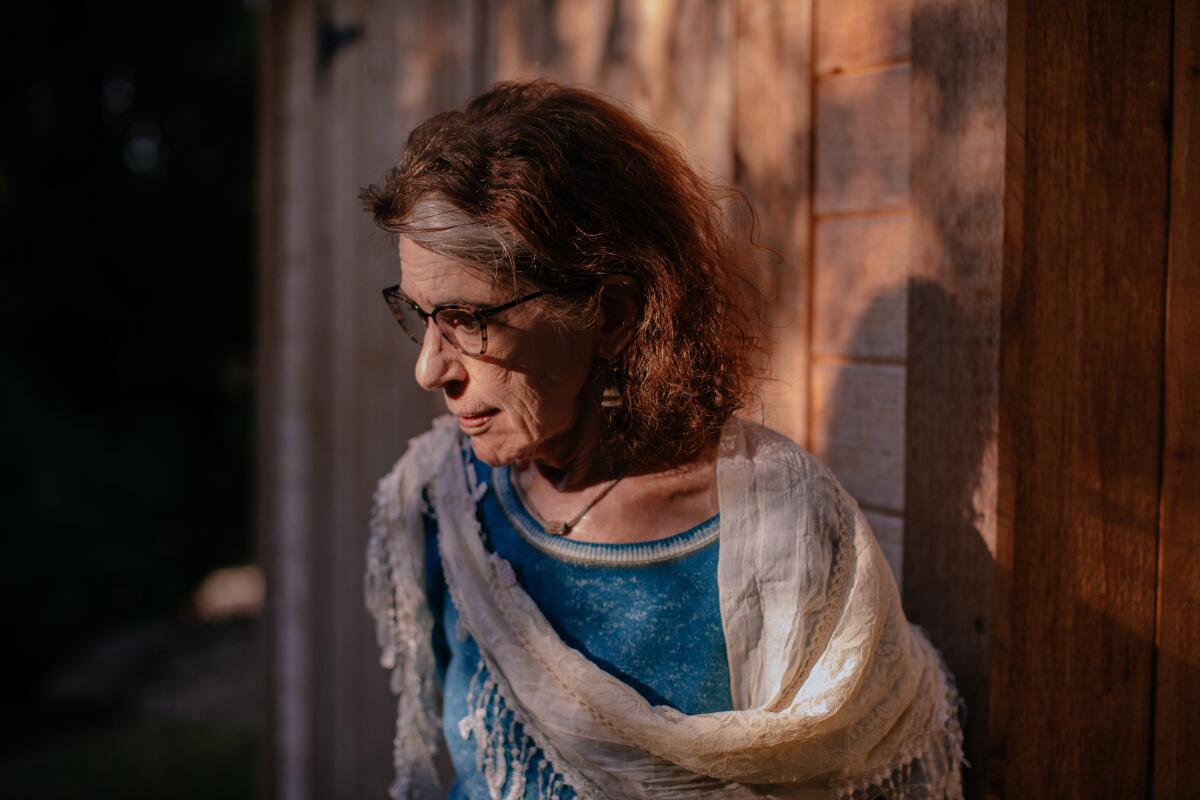
These are, of course, unsubtle times — more ominous, more rage-inducing. “I’ve been honestly questioning if women can ever truly be on a par with men,” she says of our post-Roe country. “We have to keep pushing that rock up the hill.” It’s a responsibility she feels all the more acutely since her diagnosis. “I honestly feel like I need to stay alive until I see Trump go down.”
From the outside, it might seem hard to reconcile the roller coaster of anger with Emmons’ equanimity over her terminal illness. “I feel very much at peace alongside the anger,” she says. “It’s really strange, this disease. It gives you so much time to think and see people you’ve loved. It is really hard not to arrive at a place of acceptance. I am happier in some ways than I’ve ever been in my life before.”
A week after her diagnosis — “six days actually” — she married Calandrino, her partner of more than 20 years. “It was so much fun. Here on the patio with friends who brought cake and flowers and conducted the service. It was really the best.”
ALS has forced Emmons to recalibrate the ideal of self-reliance passed down from her mother. “Paul, who is my second husband, has taught me so much about how to love and accept love and help.” Her son Ben, now in his early 30s, “has been talking very openly to me and visiting a lot and checking in on me. It is so great after an adolescence in which he was a man of few words.”
Rebuilding Marianne Wiggins’ novel ‘Properties of Thirst’ after a debilitating stroke, the author and her daughter embarked on the project of their lives.
Accepting help requires vulnerability; Emmons has managed it by tending toward extreme honesty in both her life and work. “I am wide open these days. No secrets. I have been writing a blog in which I hold very little back. I feel I have nothing to lose, and it has been such a good feeling. And I think it must be creeping into my fiction too.”
She is also at work on a new manuscript. “I think what I want most in terms of writing is to finish the novel I am working on. Now it’s a race against the weakening muscles of my hands.” She can still write longhand, as she’s always preferred, but is learning to use an eye-gaze synthesizer. “It’s a much slower process,” she says.
Writers are often loath to discuss what they’re currently writing, but Emmons has let go of this affectation too. “It is very much of a work in progress,” she says to my question. “I wanted to write about evil.”
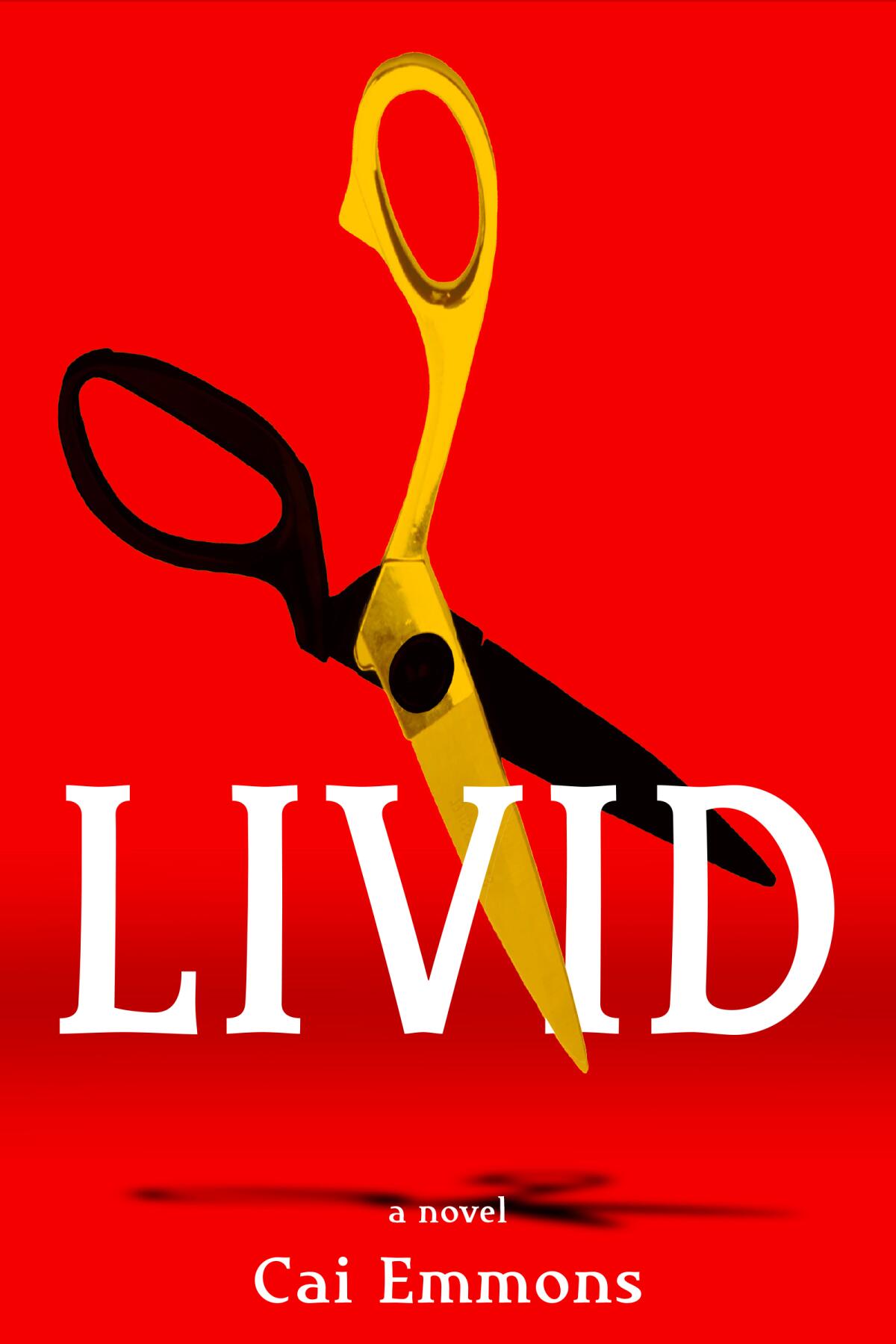
She laughs when I say it’s a “small topic,” but grows solemn in unpacking it. “I am so interested in how Trump gets young men to do what they do, the explosion and violence.” It stems in part from emotional pain, she believes, “but it’s a woundedness that calcifies in these older men, and it comes out as rage against Black people, and in class rage, gender rage.”
Rage and acceptance continue to preoccupy her work, but one thing Emmons has determined not to do is write a memoir. That energy goes into the blog, as well as a documentary in progress that will follow her up to the day of her death. She accepts the possibility of posthumous publication — both a stitched-together memoir and still-unpublished manuscripts. She has worked, she says, to detach her ego from this hard fact of her truncated life.
A guide to the literary geography of Los Angeles: A comprehensive bookstore map, writers’ meetups, place histories, an author survey, essays and more.
The average life expectancy after a bulbar-onset ALS diagnosis is 2½ years, though recent medical advances have caught Emmons’ eye. A revolutionary treatment that shows signs of reversing damage done by ALS appears on the horizon. Human trials could begin as early as 2024.
“Honestly, I don’t expect to be alive for that,” she says. “It is fun to think about, but I am not staking much on it.”
She has been moved, however, to ask herself whether she would really want that last-minute reprieve in the face of death. She answers her own posed question. “Yes,” she says. “Because there are always things to live for. But I have had a good life. I can’t complain.”
Berry writes for a number of publications and tweets @BerryFLW.
More to Read
Sign up for our Book Club newsletter
Get the latest news, events and more from the Los Angeles Times Book Club, and help us get L.A. reading and talking.
You may occasionally receive promotional content from the Los Angeles Times.

